Description
Editors: Carol Smallwood & Suzann Holland
Foreword: Supriya Bhatnagar
ISBN: 978-1-926780-13-9
Dimension: 6 x 9″
Number of Pages: 345
Synopsis: Women Writing on Family: Tips on Writing, Teaching and Publishing provides guidance and insight for women who write about family. Award winning women writers from all walks of life share their experiences in planning, composing, editing, publishing, teaching, and promoting work in a variety of writing genres. Readers will learn to tackle sensitive family issues and avoid pitfalls in memoir writing, poetry, fiction, and others. Filled with tips, exercises, and anecdotes, this anthology is appropriate for both well-seasoned writers and those just beginning.
About the Contributors
Multi-award winning writer, Diana Amadeo, has written three books: There’s a Little Bit of Me in Jamey (Albert Whitman & Company, 1989), Holy Friends (Pauline Books and Media, 2005), and My Baby Sister is a Preemie (Zondervan, 2005). Her essays have appeared in seven Chicken Soup for the Soul books and over 550 other publications. Yet, she persistently, tweaks and rewrites her thousands of rejections with eternal hope that they may yet see the light of day.
Sheila Bender’s memoir, A New Theology: Turning to Poetry in a Time of Grief, appeared in 2009 from Imago Press. Other books include Creative Writing Demystified (McGraw-Hill, 2010), and Writing and Publishing Personal Essays, Second Edition (Silver Threads, 2010). She’s written for The Writer’s Chronicle, Writer’s Digest magazine, and The Writer; she publishes weekly articles at Writing It Real.com. Two book titles are available electronically at IAJW.com and Libertary.com.
Lee Skallerup Bessette teaches writing at Morehead State University in Kentucky. Dr. Bessette has a PhD in Comparative Literature from the University of Alberta, Canada. She has published numerous academic essays, but also has had her writing about parenting and work/life balance appear in The New York Times Motherload blog and on Insidehighered.com. She edited Anne Hebert: Essays on Her Works (Guernica Editions, 2010). Her blog is at collegereadywriting.blogspot.com.
After thirteen years in the secondary English classroom, Jenn Brisendine now pursues fiction and non-fiction projects and freelances educational materials. Her literary non-fiction essay “Twists in the Plot” appears in The Maternal Is Political (Seal Press, 2008), and her work has also appeared in Mom Writer’s Literary Magazine and Literary Mama. She has an MA in fiction writing and lives in southwestern Pennsylvania with her husband and two sons.
Daphne Butas is a feature writer for AOL, and a specialist in educational content for various publishing houses. She holds a BA in American History and English from the University of Maryland, and her work has appeared in: Motherverse, Momazine, The Virginia Construction Journal, Fighting With JEB Stuart: Major James Breathed and the Confederate Horse Artillery, and The Navy Mutual Aid Association Newsletter. Daphne lives with her family and writes outside of Washington, D.C.
Ingeborg Gubler Casey received her PhD in clinical psychology from the University of Wisconsin-Madison in 1967. She’s taught psychology, including courses on the psychology of women, at the college level, practiced psychotherapy for forty years and given many workshops on understanding dreams. Her memoir about her relationship with her schizophrenic mother, The Heart Moves in a Circular Direction: A Story of Healing (iUniverse, 2007) includes dreams and inner dialogs.
After fourteen years at the Smithsonian’s National Museum of the American Indian (NMAI), Karen Coody Cooper now works at the Cherokee Heritage Center, Tahlequah, Oklahoma. Initially studying journalism, she completed a BA in anthropology/sociology at Western Connecticut State University and a Master of Liberal Studies at the University of Oklahoma. She authored Spirited Encounters: American Indians Protest Museum Policies and Practices (AltaMira Press, 2007) and co-edited Living Homes for Cultural Expression (NMAI, 2005).
Laila Dahan teaches academic writing at the American University of Sharjah in the United Arab Emirates. She is the author of Keep Your Feet Hidden: A Southern Belle on the Shores of Tripoli (Melrose Books, 2009). Her co-edited book entitled Global English and Arabic: Issues of Language, Culture, and Identity is forthcoming from Peter Lang Publishers. Laila holds MAs in Political Science and TESOL and is currently writing her doctoral dissertation on language education and Arab identity.
Lela Davidson’s award-winning essays have appeared regularly in family and parenting magazines throughout the country. Her family humor column, “After the Bubbly,” was honored in 2006 by the Oklahoma Writers Federation. Her memoir pieces have appeared in Visions literary journal and the Story Circle Journal. She balances deadlines with two children, a traveling husband, volunteer work, friends, wine, and chasing after the world’s fastest dog. She is also the parenting columnist on HubPages.com and a regular contributor to ParentingSquad.com.
Martha Engber received a 5-star rating from the Midwest Book Review for The Wind Thief, (Alondra Press, 2009). She appears in Contemporary American Women: Our Defining Passages (All Things That Matter Press, 2009). Martha wrote, Growing Great Characters From the Ground Up (Central Avenue Press, 2007). She’s had a full-length play produced in Hollywood and fiction in Watchword, Iconoclast, Anthology, Bookpress, Berkeley Fiction Review and others. She maintains marthaengber.blogspot.com, a Q & A blog for writers.
Christin Geall teaches nonfiction at the University of Victoria. Her columns, reviews and essays have appeared on Literary Mama, in Galleries West, Red Berry Review, Slow, Motherwords, Monday, and recently in Walk Myself Home (Caitlin Press, 2010). Her work is forthcoming in Becoming: Women’s Stories (Nebraska), and 21st Century Motherhood (Demeter). A graduate of the Stonecoast MFA, Christin’s thesis garnered representation from an American agency, and she has been struggling with retrospection ever since. http://christingeall.wordpress.com
Cathy Gildiner has written two memoirs entitled Too Close to the Falls (ECW Press, 1999) and After the Falls (Viking, 2010). The first was nominated for the Trillium award and won the different drummer’s award. Seduction (Knopf, 2005) is a novel about Darwin and Freud and was listed in Der Spiegel in Germany as a top mystery. All three books have been on the best sellers’ lists and have been internationally nominated for various prizes. Cathy presently lives in Toronto.
Caroline M. Grant is editor-in-chief of Literary Mama.com, where she writes a regular column, Mama at the Movies. She is also co-editor of the anthology Mama, PhD: Women Write About Motherhood and Academic Life (Rutgers University Press, 2008). Her new book is called The Dish: Making the Meals that Make Your Family; her essays have been published in a number of journals and anthologies. She lives in San Francisco with her husband and two sons.
Carol Hawkins obtained her PhD at the University of New Hampshire in 1999; her MA in English from the University of Colorado in Denver. Most recently, she held the position of Writing Center Director at Colby College in Maine and at the American University in Bulgaria. Dr. Hawkins directed the Freshmen English Program at the University of Maine in Fort Kent and appears in the National Women’s Studies Journal, and Praxis: A Writing Center Journal.
Aubrey Hirsch’s stories, essays and poems have appeared in numerous literary journals including Hobart, Third Coast, The Los Angeles Review and The Minnetonka Review, and in the anthology Pittsburgh Noir (Akashic Books, 2011). Her work has been nominated for the Pushcart Prize and the Micro Award and honored on the short list of Glimmer Train’s Fiction Open. She currently serves as the Daehler Fellow in Creative Writing at Colorado College in Colorado Springs.
Kate Hopper teaches writing at The Loft Literary Center. She has an MFA in creative writing and has been the recipient of a Fulbright Scholarship and a Minnesota State Arts Board Grant. Her writing has appeared in Brevity, Literary Mama, and The New York Times online. Use Your Words: A Writing Guide for Mothers, is forthcoming from Viva Editions in 2012, and she’s finishing a memoir, Ready for Air. She’s an editor at Literary Mama.
Anne Ipsen has self-published two memoirs: A Child’s Tapestry of War (Beaver’s Pond Press, 1998) about her WWII Danish childhood and Teenage Immigrant as a youth in Boston. The historical novels, Karen from the Mill (Beaver’s Pond Press, 2005) and Running before the Prairie Wind (Ibus Press, 2009), follow Karen from adolescence on a Danish island to married immigrant life in Minnesota. At the Concord of the Rivers (Ibus Press, 2011) is set in Puritan New England. An experienced teacher, Dr. Ipsen conducts workshops On Being an Independent Writer.
Colleen Kappeler is a writing teacher, editor, and writer. Colleen has edited books for several published writers and taught hundreds of writers in the past 10 years. Her essays have appeared in national publications like MOMSense, Adoption Today, The Christian Science Journal, and the Chicken Soup series. She is a contributing editor for e-zines Mommies Magazine and Expose Kenosha. Colleen lives in Wisconsin with her husband and two children. She is currently pursuing an MA in Writing and Literature.
Amber E. Kinser is Professor and Chair of the Department of Communication at East Tennessee State University. She earned her PhD from Purdue University. She is author of Motherhood and Feminism (Seal, 2010) and editor of Mothering in the Third Wave (Demeter, 2008). Her work appears in Encyclopedia of Mothering and collections such as Feminist Mothering (SUNY, 2008), and Mother Knows Best (Demeter, 2009). To read her blog “Dr. Mama” and more about her work, visit amberkinser.com.
Madeleine Kuderick is passionate about writing stories that touch the heart. Her work appears in Chicken Soup, Cup of Comfort, Hallmark Gift Books, and other anthologies. She has a special interest in engaging reluctant readers and the teachers
who touch their lives. Madeleine holds a Master’s degree from Saint Leo University. She is a member of the Society of Children’s Book Writers and Illustrators (SCBWI) and a graduate of the Institute of Children’s Literature. More information is available on her website at: www.madeleinekuderick.com.
Diane LeBlanc is the author of two poetry chapbooks: Dancer with Good Sow (Finishing Line Press, 2008) and Hope in Zone Four (Talent House Press, 1998). Diane received the Bechtel Prize from Teachers & Writers Collaborative for her essay “Weaving Voices: Writing as a Working Class Daughter, Professor, and Poet.” Her work appears in Bellingham Review, Natural Bridge, Rhino, So to Speak, Water~Stone, and other journals. Diane directs the writing program and teaches at St. Olaf College.
Jen Lee is a Brooklyn-based writer and a collector of stories, many of which unfold in her vibrant neighborhood or in the lives of her closest friends. A performer in New York City’s storytelling scene, she has been featured on The Moth Mainstage. Jen is the creator of Solstice: Stories of Light in the Dark (audio), Fortunes, and Take Me With You: A Journal for the Journey. She leads workshops and retreats on storytelling, writing and the creative life. You can find her online at jenlee.net.
Corbin Lewars (corbinlewars.com) is the author of the memoir Creating a Life: The Memoir of a Writer and Mom in the Making (Catalyst, 2010), which has been nominated for the PNBA book award. Her essays have been featured in over twentyfive publications including Hip Mama, Mothering, Stories with Grace and Midwifery Today. She was the editor of Verve, a Seattle women’s magazine and has been a writing mentor and instructor for over fifteen years.
Geri Lipschultz has appeared in The New York Times, Kalliope, Black Warrior Review, Cezanne’s Carrot, Kartika Review, Umbrella Journal, and the journal of the National Council of Teachers of English, College English. Her one-woman show was produced in New York City by Woodie King, Jr. She received the Creative Artists in Public Service Fellowship, New York State Council on the Arts. She has an MFA from University of Iowa and is a doctoral candidate in English Literature at Ohio University.
After teaching English for many years, Dahlma Llanos-Figueroa obtained her MLS from Queens College of the City University of New York and served as a young adult librarian for the New York City Department of Education until her retirement in 2004. Dahlma was selected as one of two runnerups for the 2009 PEN America Bingham Fellowship for Writers for her first novel, Daughters of the Stone (St. Martin’s Press, 2009). You can contact Dahlma through her web site at www.llanosfigueroa.com.
Arlene L. Mandell, a retired English professor from New Jersey, now lives in Santa Rosa, California. A former writer for Good Housekeeping Magazine, her poems, essays and short stories have appeared in more than 300 publications, including “The Metropolitan Diary” section of The New York Times, Women’s Voices, Tiny Lights, and 16 anthologies. Her most recent publication is Scenes from My Life on Hemlock Street: A Brooklyn Memoir, which can be read on line at echapbook.com/memoir/mandell.
Ann McCauley worked as a freelancer for local newspapers and periodicals while working as an RN. She has authored two novels, Mother Love (Publish America, 2003) and Runaway Grandma (Madison Avenue Publishers, 2007). Mother Love received the Reviewer’s Choice Award in 2005. Runaway Grandma was nominated for Book of the Year in Women’s Issues in 2008. Her third novel, It Happened on Willow Lane, is forthcoming. Ann enjoys gardening and traveling with her husband.
Judy M. Miller is an adoption educator and also teaches online through JudyMMiller.com. She presented at Story Circle Network’s Stories from the Heart V conference in Austin, Texas (2010). She is a columnist for the online adoption site, Grown in My Heart. Her writing has been published in parenting and adoption magazines as well as A Cup of Comfort for Adoptive Families (Adams Media, 2009), Pieces of Me (EMK Press, 2009) and Chicken Soup for the Soul: Thanks Mom (Chicken Soup for the Soul, 2010).
Rosemary Dunn Moeller has been published in Vermillion Literary Project, Mobius: The Poetry Magazine, Darkling, English Journal, The Upstart Crow, Encore, Quilt Stories, Life on the Farm and Ranch, Contemporary American Women and has writing coming out in Avocet, the Reach of Song, the Art of Music and Feile-Festa. She and her husband farm in South Dakota. She’s taught ESL in Bamako, Mali in the Peace Corps and in Miyasaki, Japan as a Fulbright Scholar.
Yelizaveta P. Renfro’s short story collection, A Catalogue of Everything in the World (Black Lawrence Press, 2010), won the St. Lawrence Book Award. Her fiction and nonfiction have appeared in Glimmer Train Stories, North American Review, Colorado Review, Alaska Quarterly Review, Witness, Blue Mesa Review, Untamed Ink, So to Speak, and elsewhere. She holds an MFA from George Mason University and a PhD in English from the University of Nebraska-Lincoln.
Mary Rice is a former journalist and folklore archivist. She is a current faculty member at Brigham Young University. Her recent publications include articles in English Journal, Educational Leadership, Brock Education, and Teaching and Teacher Education. Her research focuses are literate identity and advocacy. She also teaches language arts and English as a second language classes to junior high students. She was honored as the 2008 Utah Bilingual Educator of the Year.
Lisa Romeo’s work has appeared in The New York Times, O, The Oprah Magazine, literary journals, online venues and essay collections, including Why We Ride: Women Writers on the Horses in Their Lives (Seal Press, 2010). A former public relations specialist and equestrian journalist, Lisa holds an MFA from the University of Southern Maine. She teaches memoir and creative nonfiction in the Rutgers University Writing Program Extension and privately online, works as a freelance editor, and is writing a memoir of linked essays. Lisa lives in New Jersey with her husband and two sons.
Anna Saini has lived many lives as a political scientist, radical activist and multi-media artist. She completed a BA in Political Science from the University of Toronto and a MA in Public Policy from McMaster University. She works as a community organizer on issues of equality in higher education, prison abolition, gender-based violence and labor rights. Her writing appears in Bitch Magazine, Diverse Voices Quarterly, Two-Bit Magazine, VOCES and in the anthology Colored Girls (CreateSpace, 2010).
Cassie Premo Steele, PhD, is a Pushcart Prize nominated poet, writer, and creativity coach who lives along a creek in South Carolina. She is the author of eight books, including most recently This is How Honey Runs, an audio book of her poetry with original music from Unbound Content. Her writing and coaching focus on the themes of mothering, creativity, and living in relationship with the natural world. Her website is www.cassiepremosteele.com.
Rebecca Tolley-Stokes is writer, blogger, and librarian who writes about family and parenting both personally and professionally. Her encyclopedia entry “Blogs and the Blogosphere” is forthcoming from The Multimedia Encyclopedia of Women in Today’s World. Her book reviews appeared in Library Journal, Choice, Gastronomica, and Feminist Collections. She’s contributed encyclopedia articles to The Encyclopedia of Motherhood, Women in the American Civil War: An Encyclopedia, The Business of Food: Encyclopedia of the Food and Drink Industry among others.
Anne Valente’s fiction has appeared in Unsaid, Annalemma, Keyhole and Dzanc Books’ Best of the Web 2010 anthology, among others. Her non-fiction has appeared in The Washington Post. She earned her MFA in creative writing from Bowling Green State University and her MS in journalism from the University of Illinois at Urbana-Champaign. She is the assistant editor of the literary journal Storyglossia and lives in Ohio.
Kezia Willingham, MSW, works for Seattle Public Schools. She graduated cum laude from Oregon State University with a Bachelors degree in Human Development and Family Sciences and from University of Washington with a Masters Degree in Social Work. Ms. Willingham has been published in Literary Mama, Hip Mama, and Reality Mom. Once a high school dropout and single mother on welfare, Ms. Willingham is now married and lives with her multiracial family in Seattle, Washington.
Anne Witkavitch has an MFA in Creative & Professional Writing from Western Connecticut State University. She is the editor of the anthology, Press Pause Moments: Essays about Life Transitions by Women Writers, recipient of a 2011 Clarion Award. She was managing editor of the 2010 Thin Threads anthology. Her work has appeared in publications such as: Miranda Literary Magazine and TravelingMom.com. Anne lives in Connecticut with her husband, two children, a dog and a cat. Visit her blog at theeclectwriter.typepad.com.
Gayle Zinda, a former nurse and business owner, travels the country speaking and writing on the issues of cancer awareness. Her first book, Pink Lemonade, in 2007, received a gold USA Book News Best Books Award and two silver Independent Publishers Awards. She received the Madison Business Woman of the Year in 2007. Gayle is a member of the National Speakers Association and the Women’s National Book Association.

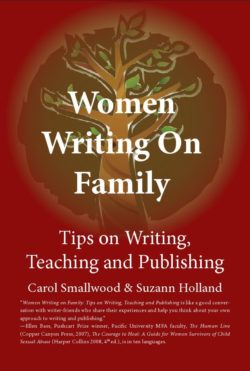
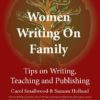
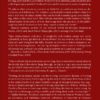
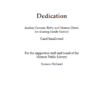
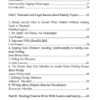
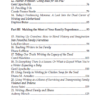
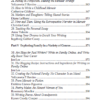
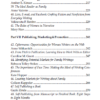
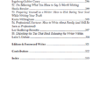
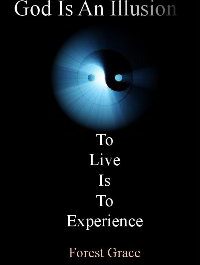
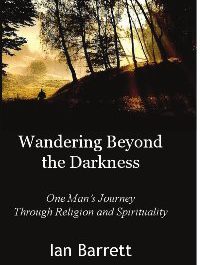
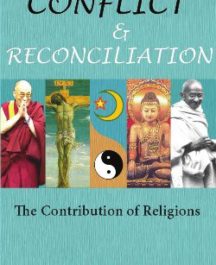
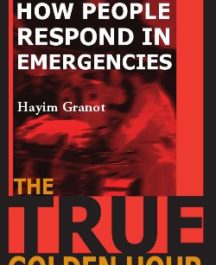
Eleanor Lerman –
“Family is what creates us, sustains us, bedevils us, confuses us, loves us, destroys us, and defines us. For writers–particularly women writers–family is also a rich vein of subject matter that can be both nourishing and overwhelming, often at the same time. This volume examines a wide variety of family-related issues from points of view that range from the practical to the philosophical, but all focused on how they impact women who write.”
-Eleanor Lerman, author of The Sensual World Re-Emerges (Sarabande Books, 2010) and Janet Planet (Mayapple, 2011), among other volumes
Ellen Bass –
“Women Writing On Family: Tips on Writing, Teaching and Publishing is like a good conversation with writer-friends who share their experiences and help you think about your own approach to writing and publishing. If you want to preserve your family history for future generations, write a memoir, or just explore your own family’s stories, this book is full of accessible and useful suggestions.”
-Ellen Bass, poet and faculty in the Pacific University MFA program; The Human Line (Copper Canyon Press, 2007)
Linda Rodriguez –
“From how to deal with relatives who feel betrayed to finding bits of time to write while raising children to blogging and writing for the internet, Women Writing On Family: Tips on Writing, Teaching and Publishing is a major resource for women who write about family in nonfiction, fiction, and poetry. Lela Davidson’s essay about using research and creative imagination to bring your ancestors to life on the page, Rosemary Moeller’s on writing with respect about devoutly religious families and communities when you are a freethinker, and Kezia Willingham’s on taking the risk to write your own truth are just a sampling of the gems of advice, technique, professional tips, and encouragement that make up this valuable book.”
-Linda Rodriguez, Heart’s Migration (Tia Chucha Press), 2010 Thorpe Menn Award for Literary Excellence
Jennifer Tang –
“This is a comprehensive work that belongs on any nonfiction writer’s bookshelf. Not only does it address the legal and emotional costs that come with the challenge of writing about family, it offers insights into how one can nurture a rewarding writing career in conjunction with a demanding day job and family obligations.”
-Jennifer Tang, New York City librarian and freelance writer for Newsweek, L.A. Times, and Fitness magazine
Marilyn L. Taylor –
“This extraordinary collection of insightful, well-written essays will serve splendidly as both guidebook and motivator for any woman who is writing seriously and living her life fully. Matters as diverse as family dynamics, realistic time-management, marketing strategies—even ways of writing more effectively—are covered here with great sensitivity and common sense.”
-Marilyn L. Taylor, Ph.D., Wisconsin Poet Laureate, 2009-2010; Going Wrong (Parallel Press, 2009)
Phyllis Holman Weisbard –
“Writing about family carries out the writing instructor’s dictum of writing about what you know, but brings along the very family issues that draw writers to the subject in the first place. Besides a range of thoughtful pieces that capitalize on family strengths yet confront any issues head on, Women Writing On Family offers new writers sage advice on finding the time to write, using the Internet to advantage, and successfully publishing their work-–on any topic.”
-Phyllis Holman Weisbard, University of Wisconsin System Women’s Studies Librarian, and Publisher, Feminist Collections: A Quarterly of Women’s Studies Resources
Key Publish –
“With all the rhetoric today about family, it is nice to see a volume that actually deals with family in way that is creative, honest, and tasteful. Women Writing On Family: Tips on Writing, Teaching and Publishing provides sensible guidelines to use and savor. Not to be missed by those studying family history. The stories and ideas contained within are jewels of wisdom that women will find useful. Oh and men can get something out of this book too!!!!”
-Robert G. Weiner, associate humanities librarian, Texas Tech University; contributor, History of the Holocaust (Routledge, 2011); Editor, Captain America and the Struggle of the Superhero (McFarland, 2009)
Sarah Passonneau –
“The essays in Women Writing On Family: Tips on Writing, Teaching and Publishing are written by experts in the field who balance keen intellect and practical tips with a sensitivity for personal histories. This is an a must have work for anyone interested delving into the complex and rich world of family histories.”
-Sarah Passonneau, Iowa State University, assistant professor
Vera Gubnitskaia –
“It is only natural for women, traditional keepers of language and storytellers, to share their experience on writing memoirs and recording a family history. From conception to delivery, this anthology covers a wide variety of aspects that a woman writer may encounter on her journey.”
-Vera Gubnitskaia, Youth Services Manager, Orange County Library System; contributor: Librarians As Community Partners: An Outreach Handbook (ALA editions, 2010)
Colleen Driscoll –
“As women, we have unique perspectives on life experiences. These experiences deserve an audience. This book will be invaluable to women needing guidance with the emotional, ethical, and professional avenues of getting their stories in print.”
-Colleen Driscoll, Breitung Township Schools, Michigan, Media Specialist
Kerol Harrod –
“If you’re interested in learning how to craft and market stories about family, Women Writing On Family features a wealth of experienced writers and editors to help you through every phase of the process. This comprehensive book deals honestly with the emotional, legal and practical aspects of writing close to the heart.”
-Kerol Harrod, Writer/Co-Producer of Library Larry’s Big Day, Denton Public Library, Denton, Texas; First-Place Winner of 2010 TATOA Programming Awards
Wayne Jones –
“This is a book of practical advice on writing about a sometimes messy subject, the family. Read the whole thing through, or dip in a topic you are interested in, and you’ll come away with a clear view on how to start and finish writing.”
-Wayne Jones, Queen’s University, Kingston, Ontario
Donald G. Frank –
“People interested in writing, teaching, and publishing familyfocused stories, narratives, poetry, or books will appreciate the practical and helpful contributions in Women Writing On Family: Tips on Writing, Teaching, and Publishing. Including tips on writing fiction and nonfiction as well as publishing, marketing, and promotion, this excellent anthology is timely, important, and specially relevant for writers interested in the family.”
-Donald G. Frank, Professor Emeritus, Portland State University
Chris Helvey –
“Just as every place has a story, so does every family. Women Writing On Family gives you the essentials on writing, teaching and publishing about family. Real, detailed advice from women who know. If you want to share your family stories, this book is not to be missed.”
-Chris Helvey, author of Purple Adobe and Editor-in-Chief of Trajectory
Jason Kuhl –
“From finding inspiration to practical advice about marketing and legal issues, these experienced authors’ essays serve as a roadmap for anyone putting pen to paper to capture their family’s story.”
-Jason Kuhl, Library Operations Director, Arlington Heights Memorial Library, Arlington Heights, Illinois
Dr. Robert P. Holley –
“The contributors, all published authors, to Women Writing On Family: Tips on Writing, Teaching and Publishing provide invaluable help to women authors on the more difficult than expected task of turning their family experiences into quality, marketable literary works. This rich treasure trove of advice ranges from finding time to write to crafting family history through a personal style to publishing and promoting the resulting publications in the Internet age.”
-Dr. Robert P. Holley, Wayne State University, Detroit, Michigan, contributor, Writing and Publishing: the Librarian’s Handbook (ALA Editions, 2010), author of over one hundred publications
Amazon review by L. Benton –
“Writers grappling with the thorny issues that surround writing about families will find help in this long-overdue volume of 55 essays by published writers–experts on family writing.
The anthology contains essays aimed at both beginning and experienced writers–from how to stay out of hot water when writing about family (including deceased relatives) to marketing your writing creatively, whether to editors or directly to the reading public. It also includes lists of places to submit family writing.
Some of the essays are how-to (“Keeping Your Distance: Avoiding Sentimentality in Family-Centered Writing”). Others, such as “Mothers and Daughters: Telling Shared Stories” and “How to Write a Childhood Memoir,” offer actual writing exercises. Strategies for busy writing mothers and for using poetic forms to write about family also are (happily) represented in the collection.
For experienced writers, “Now and Then: Using the Retrospective Narrator in Memoir” explains the subtle but critical distinction between protagonist and narrator (or main character and storyteller), both of whom are the writer.
The anthology succeeds as a sort of A to Z collection of answers to the questions writers face when they write about families. It’s perfect for dipping into when looking for a way out of a delicate family writing muddle.
I wish the book had gone through one final nit-picky edit to eliminate small, distracting errors in the text, like a few weird sentence fragments and misplaced quotation marks. But as a memoirist writing about family and writing instructor teaching predominantly women who are writing about family, I’m already using this valuable book for my own and my students’ work.”
-Amazon review by L. Benton
Story Circle Book Reviews –
“Anthologies can be difficult to review because there is so much packed into one volume. This one was delightfully consistent with that premise. Women Writing on Family offers suggestions to advance your writing at every level. If you are a beginning writer, just noodling around with the idea of writing about your family you could start with “On Believing What You Have to Say Is Worth Writing” by Sheila Bender. If you have been writing for a while and are thinking about what to do with your work, there is “Identifying Potential Markets For Family Writing” by Rebecca Tolley-Stokes. Using writing to heal? Connect with “Using Writing as a Means of Surviving and Transgressing Family Violence and Trauma” by Anna Saini. If you are curious about self publishing there is “Self-Publishing from Manuscript to Finished Book: Eight Steps in Eight Months,” by Anne Ipsen.
The authors are as diverse as the content. There are professional women sharing that writing about family can be seen as “soft” or something less than professional writing. These women explore the possible career repercussions of that perception and how to manage them. Some writers describe how journaling led to a book and how blogging can lead to more involved, lengthier works. Some articles are heavily referenced; some are straight from the heart. Many of the authors are well published, for others this is their first publication. The writing styles range from instructional to extremely personal.
The book is organized into eight parts: Personal and Legal Issues about Family Topics, Finding Time to Write With Career and Family, Making the Most of Your Family Experience, Writing Exercises and Strategies, Exploring Family in a Variety of Genres, Finding Your Writing Styles, Publishing, Marketing & Promotion, and Building Your Confidence. Each part has between five and nine selections that support and expand upon the title. There is something for every woman interested in writing about family.
Memoir writing groups could use this book for the professional growth section of their meetings. I would recommend it as a go-to resource for anyone writing about family for information and inspiration.”
-Judy Whelley for Story Circle Book Reviews reviewing books by, for, and about women
Amazon Review by Anne Hays –
“Situated against a greater argument that women are uniquely poised to write about family, Smallwood and Holland’s Women Writing on Family offers creative writing students grounded and practical writing tips that cover extensive terrain. From legal and privacy issues to finding time and inspiration to write to locating critical readers to pitching your finished work for publication, this collection of essays uncovers the myriad issues likely to come up for writers tackling the intimate subject of family. The best advice in this book is practical: Martha Engber on revealing one’s family secrets without getting sued, Dahlma Llanos-Figueroa’s essay on fictionalizing family stories to avoid family coercion. Perhaps the most poignant advice comes from Anna Saini, whose piece, ‘Using Writing as a Means of Surviving and Transgressing Family Violence and Trauma,’ deftly navigates the writer’s right to tell his/her story against possible trauma such writing might churn up, while acknowledging, ultimately, the necessity of craft. ‘There is nothing wrong with pursuing writing as means to survive violence through expression. However, when your writing becomes bigger than yourself, when it extends to reveal larger truths that are relevant to others despite their differing backgrounds and experiences, to access the universal, this is when your art becomes a means to not only survive but to transgress violence.’
There are many books about creative writing on the market. Anne Lamont’s Bird by Bird for fiction writers, Vivian Gornick’s The Situation and the Story for nonfiction writers, Mary Oliver’s A Poetry Handbook for poets. The specificity behind Women Writing on Family’s premise is also its strength; this collection very exhaustively tackles specific and uncharted terrain. For memoirists writing about family, this book will prove a handy ready reference tool, one to draw upon for inspiration and practical tips along the many stages from conception to publication.”
-Amazon Review by Anne Hays
Amazon Review by Marcia R. –
“Supporting women in their writing pursuits is something that many small writing clubs do throughout the country. In these groups lives a sisterhood where women talk about how to best succeed in writing, all while balancing family, volunteering, and careers. Reading this anthology edited by Carol Smallwood and Suzann Holland is like joining a women writer’s club; it invites the reader into the world of support and wisdom brought forth by women writers. These writers show a particular understanding of what it means to be both a woman and a writer, especially one who uses her family as her inspiration.”
-Amazon Review by Marcia R.
Amazon Review by L. Benton –
“Writers grappling with the thorny issues that surround writing about families will find help in this long-overdue volume of 55 essays by published writers–experts on family writing.
The anthology contains essays aimed at both beginning and experienced writers–from how to stay out of hot water when writing about family (including deceased relatives) to marketing your writing creatively, whether to editors or directly to the reading public. It also includes lists of places to submit family writing.
Some of the essays are how-to (“Keeping Your Distance: Avoiding Sentimentality in Family-Centered Writing”). Others, such as “Mothers and Daughters: Telling Shared Stories” and “How to Write a Childhood Memoir,” offer actual writing exercises. Strategies for busy writing mothers and for using poetic forms to write about family also are (happily) represented in the collection.
For experienced writers, “Now and Then: Using the Retrospective Narrator in Memoir” explains the subtle but critical distinction between protagonist and narrator (or main character and storyteller), both of whom are the writer.
The anthology succeeds as a sort of A to Z collection of answers to the questions writers face when they write about families. It’s perfect for dipping into when looking for a way out of a delicate family writing muddle.
I wish the book had gone through one final nit-picky edit to eliminate small, distracting errors in the text, like a few weird sentence fragments and misplaced quotation marks. But as a memoirist writing about family and writing instructor teaching predominantly women who are writing about family, I’m already using this valuable book for my own and my students’ work.”
-Amazon Review by L. Benton
Amazon Review by Katie Crook –
“This wonderful collection of essays from experienced female writers gives women useful tips on how to be ethical and professional when writing about family. From understanding complex family dynamics to knowing her own motivation for sharing her story, the reader will learn how to write within the bounds of her emotions with subtlety and sincerity. Great importance is placed on treating writing as a discipline. As women with family duties, we must find time to self-nurture ourselves through writing, letting go of excuses and instead focusing on our passion for writing and, above all, telling our family story.”
-Amazon Review by Katie Crook
Amazon Review by Lisa Fraser –
“If you were listening to the women in a long-standing writers’ group, you would hear questions like these:
‘How can I write the truth about my family without damaging relationships?’
‘I want to write about my grandmother, but I don’t have many facts. How can I flesh out her character in an authentic way?’
‘I love my baby, but when will I have time to write again?’
The answers to these and dozens of other questions about writing on (and dealing with) family are contained in this treasure trove of encouragement, inspiration, and advice. Its fifty-five chapters from nearly forty published authors even cover the questions you didn’t think to ask. The contributors’ breadth of experience and the book’s logical organization make this a valuable, one-stop resource.”
-Amazon Review by Lisa Fraser
Amazon Review by Betty Marie –
“Often I have been faced with a blank mind on how to begin a written article. The examples of 55 different women who have broken through literary brick walls is very helpful to those of us developing writing skills. Thanks to the efforts of Smallwood and Holland for this excellent reference.”
-Amazon Review by Betty Marie
Amazon Review by Kindle Customer –
“This is an exceptionally useful book, that covers a wide variety of topics while staying on the theme of writing about families. There are a variety of good chapters dealing with topics from how to write about abuse, love, gender issues, to handy practical topics like how to market your book.
My only complaint is that I don’t think this book should per se be limited to women. There are issues here that would be of interest to many male writers, and it is as fine a guide to writing well on family issues as I have seen.
A particular kudos to the editors for the organization, the chapters are on brief, yet highly informative. The quality of the writing is superior to many other guides, and it reads well. Reading this is not a chore or academic exercise. Best of all, despite the brevity of many of the contributions, there is a great deal of experience and judgment packed into these pages.
This book is highly recommended for any writer, wishing to write well, and occasionally wisely, about family.”
-Amazon Review by Kindle Customer